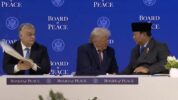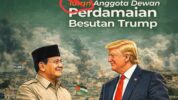Trump’s Exit from Paris Agreement Sparks Debate on U.S. Industrial Revival Impacting Indonesia
JAKARTA, RAKYAT NEWS – International relations expert Teuku Rezasyah interprets Donald Trump’s decision to withdraw the United States from the Paris Agreement as part of a strategy to reignite industrialization in the country.
Rezasyah highlighted that Trump’s focus on creating a “manufacturing country” represents a significant shift toward domestic production rather than relying on imports.
Rezasyah explained that this push for industrialization could result in the establishment of new factories, utilizing advanced technologies and tapping into the unique strengths of various states. While this development may increase productivity, it could also lead to heightened pollution levels, despite modern pollution control measures being in place.
The decision to exit the Paris Agreement, according to Rezasyah, stems from Trump’s belief that the agreement places an unfair burden on the U.S., particularly in its financial obligations to support other countries’ climate initiatives. Trump views the agreement as providing little benefit to the U.S. while demanding substantial contributions.
The emphasis on domestic priorities aligns with Trump’s campaign slogan, “Make America Great Again.” Redirecting funds previously allocated to international climate efforts toward empowering domestic industries and communities reflects this focus.
Rezasyah suggested that the move highlights the U.S.’s growing preference for unilateralism over multilateral cooperation. By prioritizing its own interests, the country appears to be shifting away from collective global action on climate change.
Despite withdrawing from the agreement, Rezasyah believes Trump may still offer environmental assistance to specific nations that align with his administration’s broader goals. This selective engagement suggests a nuanced approach to international environmental issues.


























Tinggalkan Balasan